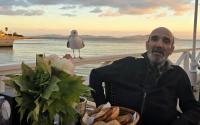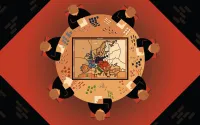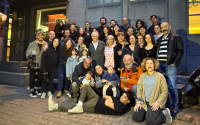18 December 2009The Guardianby Suzanne Goldenberg and Allegra Stratton
Barack Obama stepped into the chaotic final hours of the Copenhagen summit today saying he was convinced the world could act "boldly and decisively" on climate change.
But his speech offered no indication America was ready to embrace bold measures, after world leaders had been working desperately against the clock to try to paper over an agreement to prevent two years of wasted effort — and a 10-day meeting — from ending in total collapse.
Obama, who had been skittish about coming to Copenhagen at all unless it could be cast as a foreign policy success, looked visibly frustrated as he appeared before world leaders.
He offered no further commitments on reducing emissions or on finance to poor countries beyond Hillary Clinton's announcement yesterday that America would support a $100bn global fund to help developing nations adapt to climate change.
He did not even press the Senate to move ahead on climate change legislation, which environmental organisations have been urging for months.
The president's speech followed the publication of draft text, obtained by the Guardian this morning, that reveals the enormous progress needed from world leaders in the final hours of the Copenhagen climate change summit to achieve a strong deal. The draft says countries "ought" to limit global warming to 2C, but crucially does not bind them to do so. The text, drafted by a select group of 28 leaders – including UK prime minister, Gordon Brown – in the early hours of this morning, also proposes extending negotiations for another year until the next scheduled UN meeting on climate change in Mexico City in December 2010.
In his address, Obama did say America would follow through on his administration's clean energy agenda, and that it would live up to its pledges to the international community.
"We have charted our course, we have made our commitments, and we will do what we say," Obama said.
But in the absence of any evidence of that commitment the words rang hollow and there was a palpable sense of disappointment in the audience.
Instead, he warned African states and low island nations who have been resisting what they see as a weak agreement that the later alternative — no agreement — was far worse.
"We know the fault lines because we've been imprisoned by them for years. But here is the bottom line: we can embrace this accord, take a substantial step forward, and continue to refine it and build upon its foundation," he said.
"Or we can again choose delay, falling back into the same divisions that have stood in the way of action for years. And we will be back having the same stale arguments month after month, year after year – all while the danger of climate change grows until it is irreversible."
He also took a dig at China, drawing attention to its status as the world's biggest emitter and reinforcing America's hardline on the issue of accountability for greenhouse gas emissions.
The lacklustre speech proved a huge frustration to a summit that had been looking to Obama to use his stature on the world stage – and his special following among African leaders – to try to come to an ambitious deal.
The president was drawn into the chaos within minutes of his arrival at Copenhagen, ditching his schedule to take part in a meeting of major industrialised and rapidly emerging economies.
Responding to Obama's speech, a British official said: "Gordon Brown is committed to doing all he can and will stay until the very last minute to secure a deal... but others also need to show the same level of commitment. The prospects of a deal are not great."
Many reactions were strongly critical of Obama. Hugo Chávez, the president of Venezuela, described Obama's speech as "ridiculous" and the US's initial offer of a $10bn fund for poor countries in the draft text as "a joke".
Tim Jones, a spokesman for the World Development Movement, said: "The president said he came to act, but showed little evidence of doing so. He showed no awareness of the inequality and injustice of climate change. If America has really made its choice, it is a choice that condemns hundreds of millions of people to climate change disaster."
Friends of the Earth said in a statement, "Obama has deeply disappointed not only those listening to his speech at the UN talks, he has disappointed the whole world."
The World Wildlife Fund said Obama had let down the international community by failing to commit to pushing for action in Congress: "The only way the world can be sure the US is standing behind its commitments is for the president to clearly state that climate change will be his next top legislative priority."
The extent of crisis in the talks has taken leaders by surprise. The Brazilian leader, Lula da Silva, told the conference that the all-night negotiating sessions took him back to his days as a trade union leader negotiating with his bosses.






